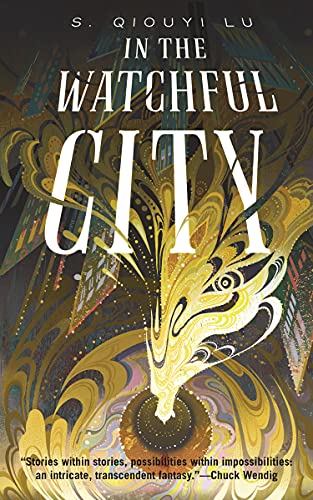
![]() In the Watchful City by S. Qiouyi Lu
In the Watchful City by S. Qiouyi Lu
In the Watchful City (2021) is a novel in story form, a structure I’m usually a big fan of, but the stories rarely felt fully developed and in the end they just didn’t coalesce for me into an entirely effective or cohesive whole, though there is a true originality in style and content here.
The setting is the city-state of Ora, which has managed to escape from under the dominating Skyland empire and, in an attempt to keep its residents free and happy, the city uses upgraded humans as “nodes” in an AI-like surveillance network (“the Gleaming”). Some specialized nodes can leap into the bodies of living creatures (though not human ones) and control them in order to intervene when necessary.
Anima is one such node and æ has been happily enacting ær role for some time. Ær regular, contented life, though, is disturbed by the appearance of a foreigner named Vessel who brings with them a sort of cabinet of curiosities, each of which has a tale behind it. Anima agrees to give something of ær own to Vessel’s cabinet in return for hearing the stories behind several objects æ selects. The novel then alternates between the objects’ tales and the overarching arc of how the stories change Anima’s view of ær world (the novel uses non-binary æ/ær pronouns throughout).
Dealing with the over-narrative first, I did like how S. Qiouyi Lu offered up some fresh takes, raising, for instance, intriguing questions regarding benevolent surveillance, as compared to most Western narratives that portray surveillance societies as exclusively dystopian. As a more concrete example of this different slant, while Westerners again tend to think of surveillance societies as a removal of all freedom, the author shows us that Ora allows for (thoughtful) suicide/euthanasia, an individual liberty many bastions of “freedom” outlaw.
Meanwhile, while not quite as unique, the vision of Ora as a center of biotech, employing the natural world more than is typical in tech solutions, along with the Asian-inspired setting/folktales, added to a sense of freshness. The same for the switch to verse in Anima’s voice.
Unfortunately, the world felt a bit too sketchy and many of the themes were not mined to their fullest potential. And while Anima is an engaging and effective character, ær story felt a bit predictable, too overtly announced for my liking, and again, undeveloped or too quickly glossed over, as when, for example, æ witnesses a traumatizing death; we do see the impact on aer, and the scene itself is quite powerful, but it did seem too fast.
The stories, while exploring similar themes (loss, sense of self, etc.) and having a similar fabulist feel to them, vary in tone and genre. “A Death Made Manifold” is a sort of queer Weird Western version of “The Monkey’s Paw.” “This Form I hold Now” follows a trans character who opts to have their feet bound and who also competes in competitive “skycup.” “The Sky and Everything Under” is an epistolary story centered on an undying (perhaps death-transcendent) queer relationship set against the background of empire and revolution. And lastly, “As Dark as Hunger” is another queer story, this set in a world of mermaids and focusing on a fisherwoman whose past and heritage collide in horrifying fashion.
The first, I’d say, was the weakest while the second spent too much time on the competition; I can’t say I found either story or either of the main characters particularly compelling or memorable. I thought the epistolary form in the third story was effective and found this the most moving and effective story overall. The last story felt too on the nose and had I thought some points that didn’t add up, placing it closer to the first two than the third in terms of its impact. Overall, the stories, like the overarching narrative, felt under-developed (save for the third).
I quite appreciated the variety in In the Watchful City, the linked-story structure, the multiplicity of genres, the difference in tones, the verse format of Anima’s voice, and, as noted, also liked the background setting. But I would have liked to have seen the stories lengthened and more developed, with more stories added in; this felt almost like a chapbook or a cobbled together work than a unified created start-to-finish whole. That said, the author is certainly one I’ll watch going forward.




I appreciate you using the book’s pronouns in the review!
Intriguing. I’ll probably order this one based on your review, Bill.
I missed some, so more props due to my editor (Jana I think did this one?) for getting my misses.
I’ll be curious what you think Marion!